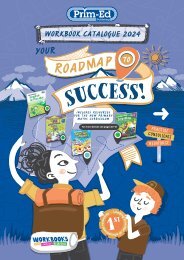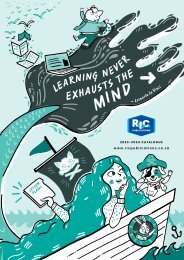20602_AC_Economics_and_buisness_Year_6_Making_choices_about_resources
You also want an ePaper? Increase the reach of your titles
YUMPU automatically turns print PDFs into web optimized ePapers that Google loves.
Resource allocation on a national level – 1<br />
A government problem<br />
<strong>Making</strong> decisions <strong>about</strong> using <strong>resources</strong> to fulfil needs <strong>and</strong> wants on a personal, business or<br />
community level is difficult enough. Imagine trying to fulfil the needs of an entire nation! This is<br />
exactly what federal governments have to do every day. In deciding on how to use <strong>and</strong> allocate<br />
a nation’s <strong>resources</strong>, a government must deal with the problem of scarcity. Scarcity means that a<br />
resource is scarce (hard to find or not easily available). While scarcity is something we all have to<br />
deal with, it becomes a huge problem when we are talking <strong>about</strong> items or services that people<br />
really need. These include basic survival needs like food supplies <strong>and</strong> clean water as well as other<br />
important needs such as education <strong>and</strong> health care. Other needs governments have to consider<br />
are energy supplies, housing, transportation <strong>and</strong> communication services. Of course, all of these<br />
require one main resource—money!<br />
Unfortunately, some countries are not wealthy <strong>and</strong>/or don’t have enough <strong>resources</strong> (most<br />
importantly, natural <strong>resources</strong>) to supply even basic needs for some or all of its citizens. Some<br />
examples of such countries are below.<br />
• In Ethiopia, most people can only get water from shallow ponds or wells. This water is unclean<br />
<strong>and</strong> can cause disease, as it is shared with animals or contaminated with waste. Ethiopia also<br />
suffers food shortages during times of drought, which are frequent.<br />
• In Cambodia, there is a lack of proper housing, which forces many people to live in slums.<br />
Here, people have no access to basic health services.<br />
• In Bangladesh, many people, particularly those living in rural areas, suffer from hunger <strong>and</strong><br />
have limited access to health care, electricity, gas <strong>and</strong> clean drinking water.<br />
Allocation of <strong>resources</strong> in Australia<br />
In Australia, we are lucky enough to have a vast range of natural <strong>resources</strong> <strong>and</strong> are also among<br />
the richest countries in the world. Most of us enjoy a high st<strong>and</strong>ard of living, with all our needs<br />
catered for—but this is certainly not the case for everyone. This includes large numbers of<br />
Indigenous Australians, who generally live with poorer levels of education, health <strong>and</strong> housing<br />
than most other Australians.<br />
Our government, like all governments around the world, has certain ways of dealing with<br />
allocating <strong>resources</strong> to its citizens. In a country like Cuba, the government has strict control <strong>and</strong><br />
owns most of the country’s <strong>resources</strong>. It even supplies people with ration books which allows<br />
them to buy a certain amount of specific food per month. But in Australia, the government has<br />
far less control. It only owns <strong>about</strong> 20% of the country’s <strong>resources</strong>. The rest is owned by private<br />
businesses. To make money, private businesses must stay aware of what people want to buy<br />
from them. This affects what <strong>resources</strong> they use to produce goods or services. This should make<br />
you, as a consumer, feel powerful! Every time you make a buying decision, you are influencing<br />
what <strong>resources</strong> are being used in our country.<br />
R.I.C. Publications ® www.ricpublications.com.au Australian Curriculum <strong>Economics</strong> <strong>and</strong> business (<strong>Year</strong> 6) 17


















